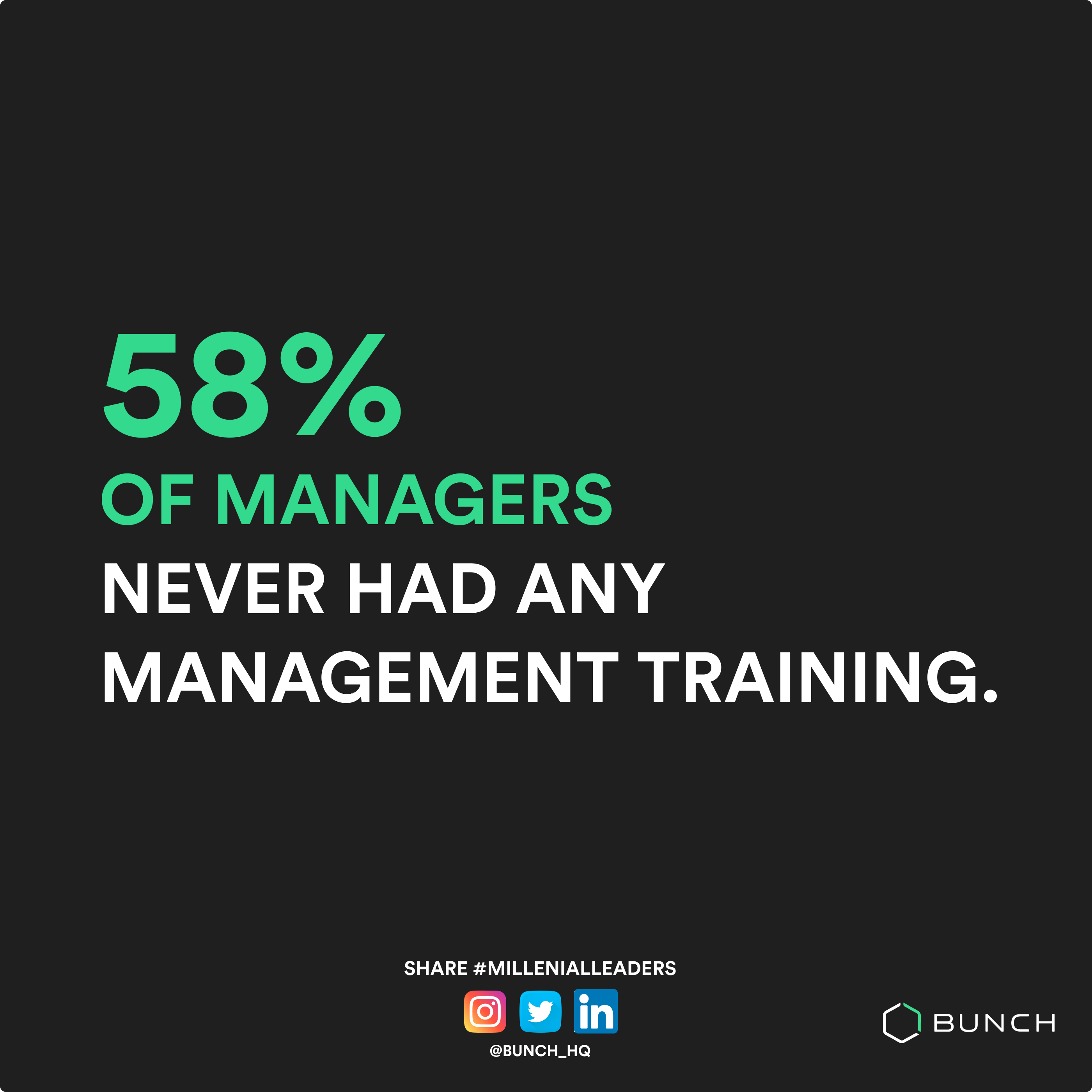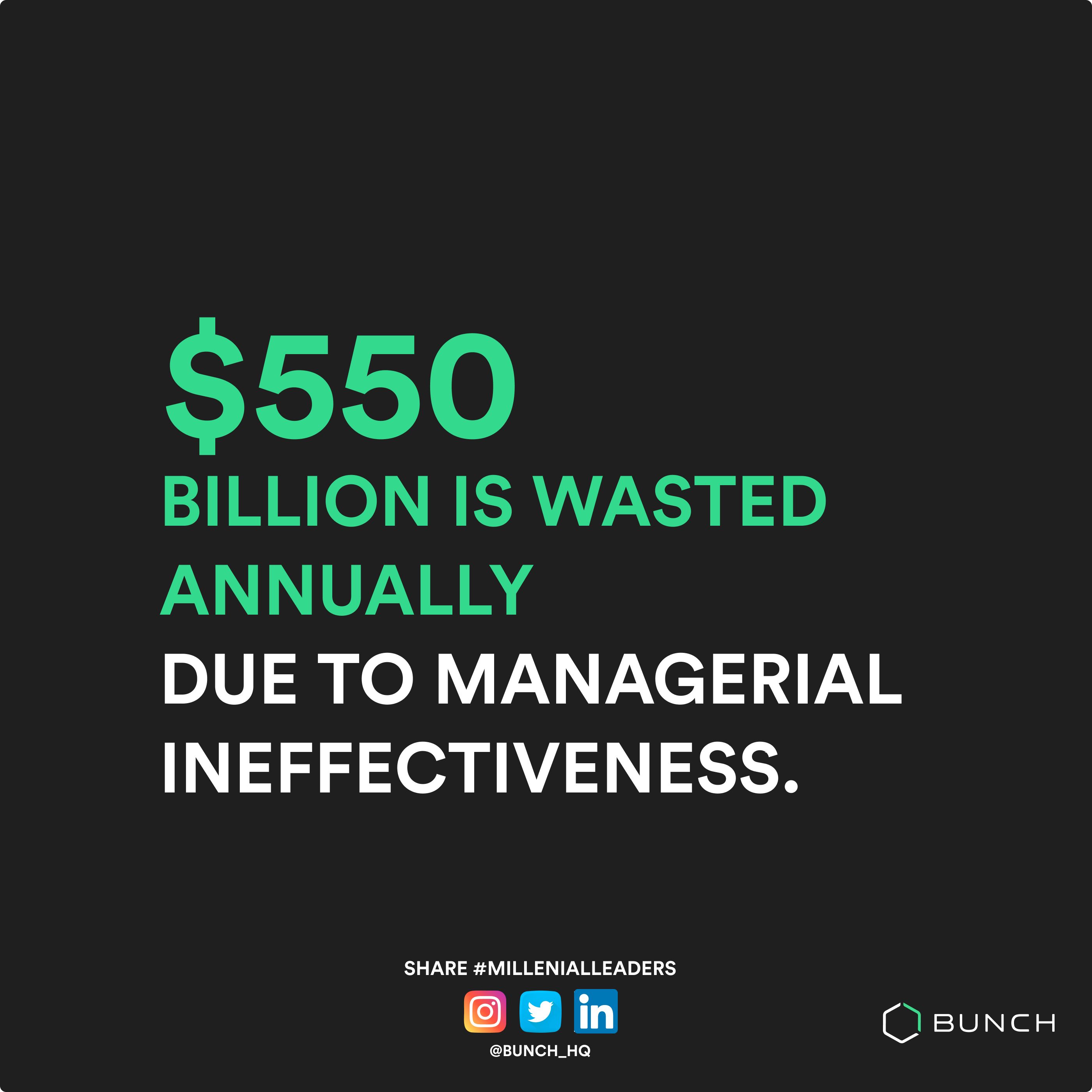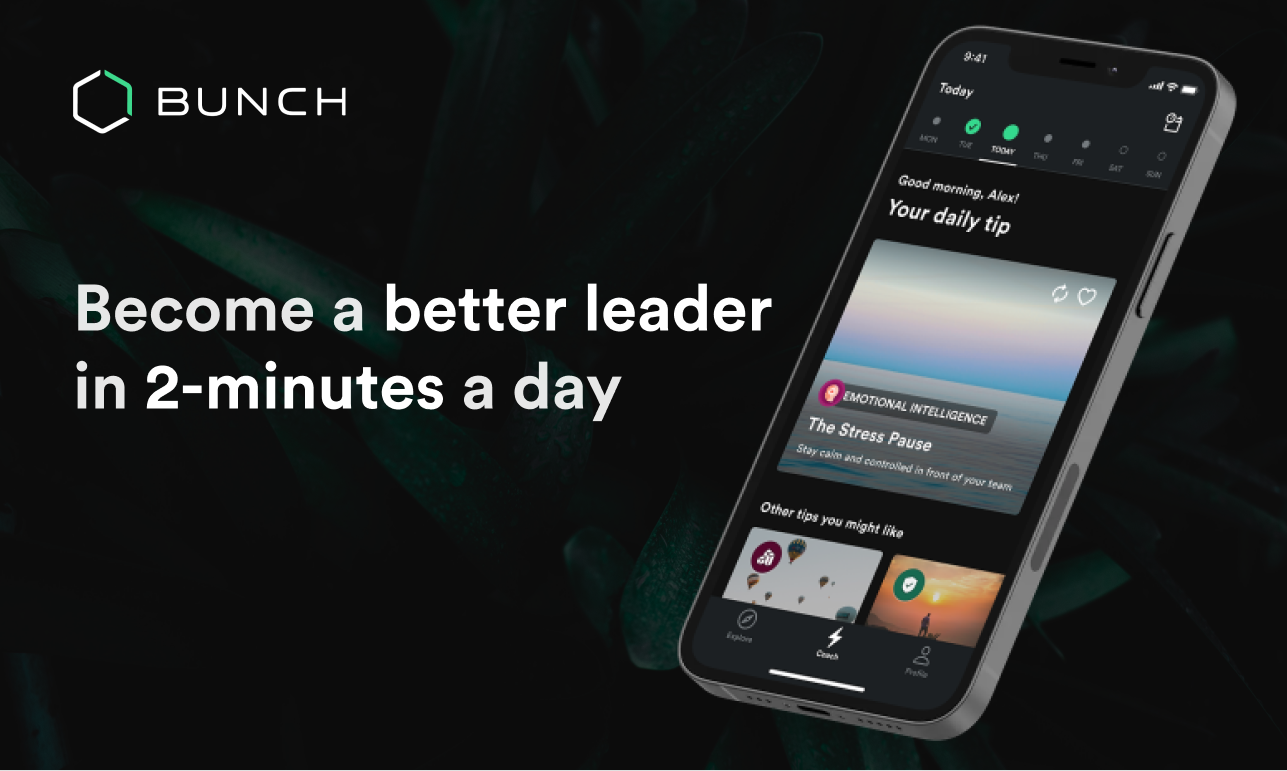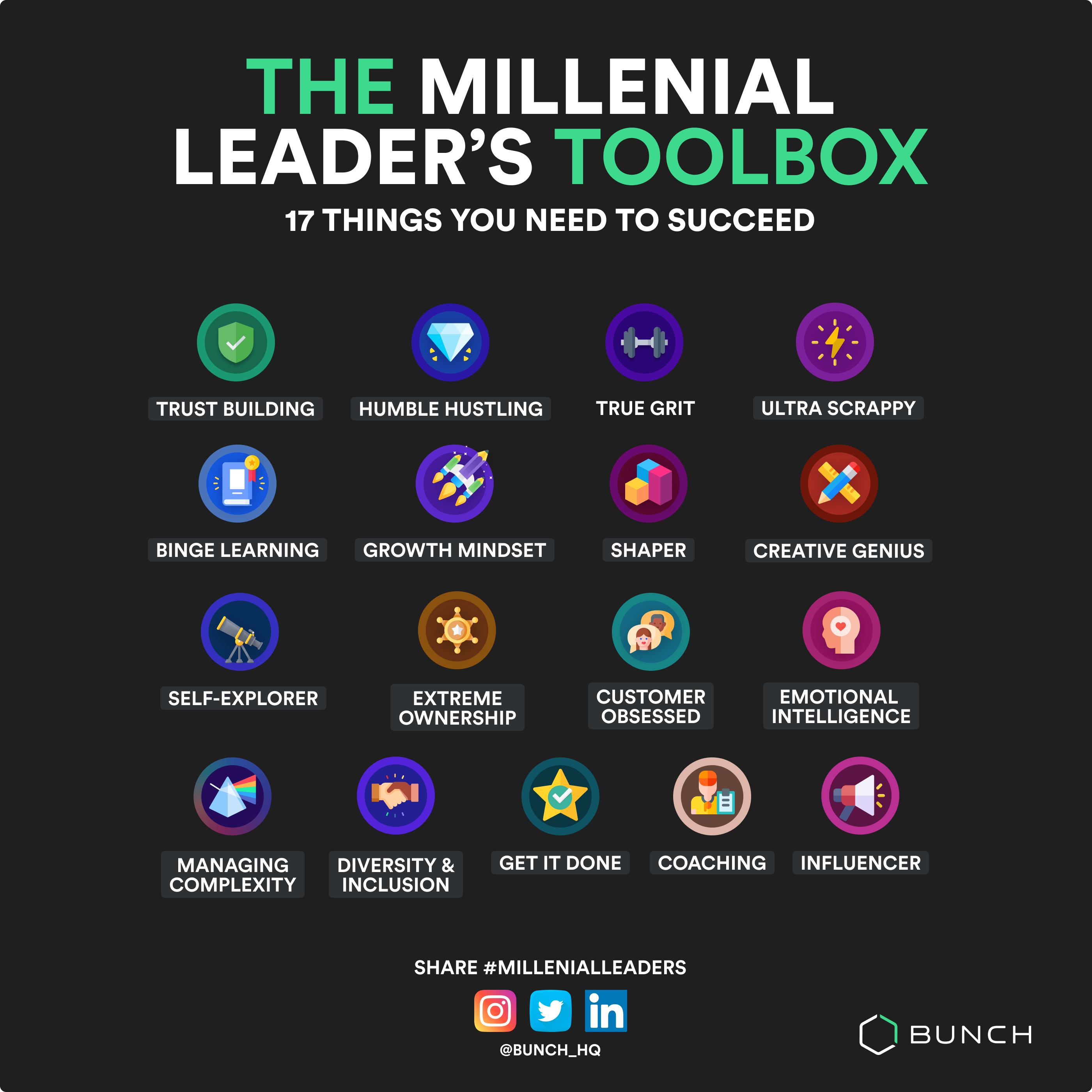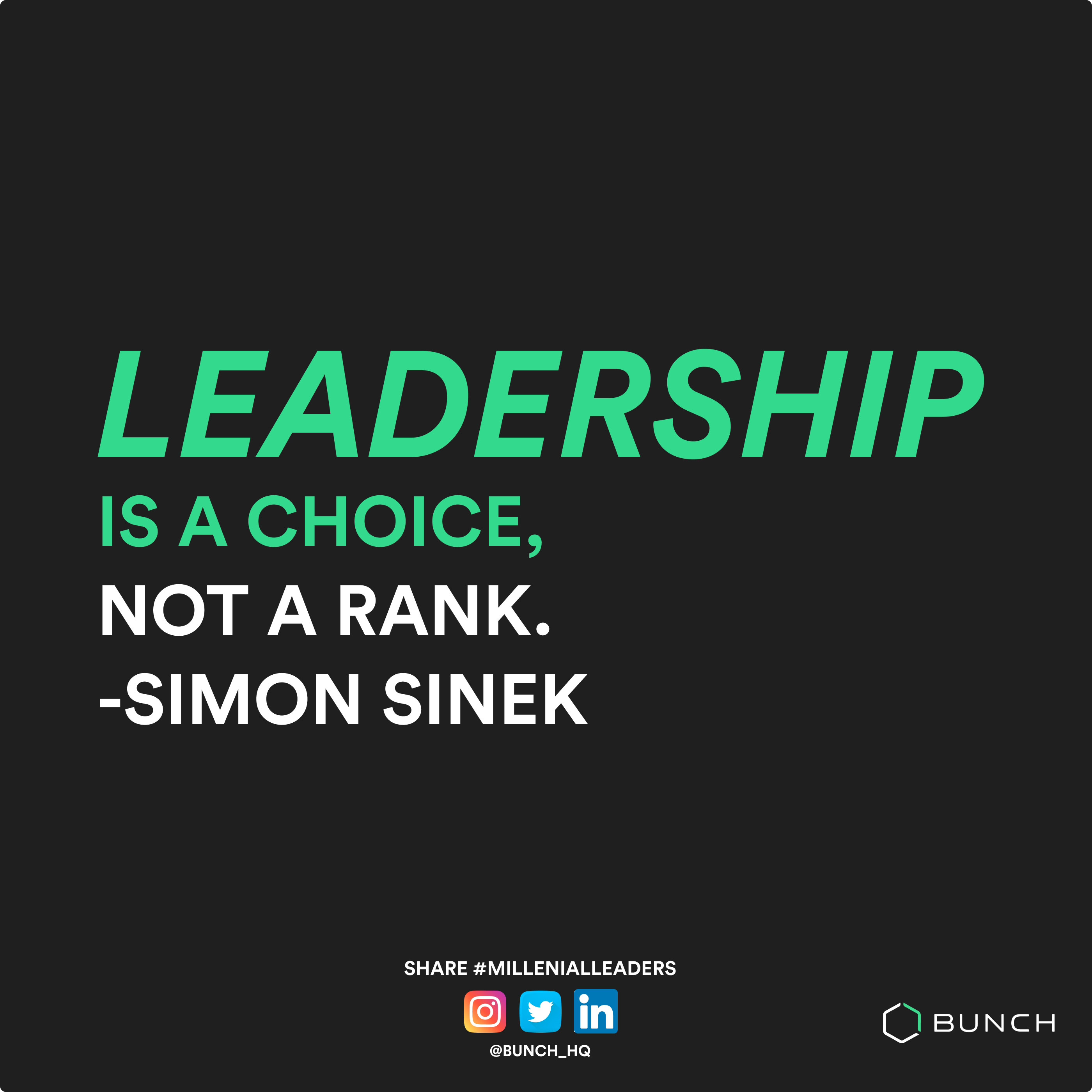Welcome to the age of democratized leadership. We’re in an era where anyone can be a leader as long as they have access to the right tools. Leadership no longer demands outright authority. Rather, it’s a set of skills that can be developed by anyone – whether they manage a team or lead their peers.
In a recent study at Bunch, we asked over 100 managers what skills they thought today’s leaders need to be successful. What we discovered paints an image of what leadership looks like today – and how ill-equipped our current, Millennial workforce is to build them.
The problem with leadership training
35% of the current workforce is made up of Millennials, of which more than one-third are managing teams and budgets. The workforce is younger, more adept with tools like social media, and understands that being a leader is a more public act than it ever has been. But what we’re using to train our leaders is antiquated in comparison.
Leadership training stopped dead in its tracks some time ago, and today’s leaders face an entirely new landscape of management. 58% of managers are not trained to lead, largely because the learning solutions offered to them are not satisfying their highly dynamic needs. We’ve set our managers up to fail and are surprised when good, strong teamwork is a modern marvel.
When a Millennial moves up in responsibility or wants to make progress in their career, it’s essentially trial by fire. In a leadership position, they learn through mistakes, which is a problematic approach for two reasons: one, there are human lives involved and this puts the team at risk; second, Gallup projected that managerial ineffectiveness and people “checking out” at work leads to $550 billion in annual wasted costs.
So what can we do about this massive gap in the market, and support our leaders so they can support their teams?
The democratization of leadership
Millennials are seeking meaningful work through which they acquire new skills and have a tangible impact. They want to learn from inspiring peers and leaders and they’re used to consuming information in short bursts on the go, instead of through long sessions. What they get, however, are traditional and old-fashioned seminars, workshops, and curricula that require month-long commitments, but result in minimal retention or practical use on the job.
Learning habits aside, these managers also don’t have enough time to sign up for an MBA, do online courses, and read long books – even if they were the most effective way to learn. They need to make progress on how they interact with their team immediately.
Bunch, the AI Leadership Coach, is at the forefront of a movement to democratize leadership. We’re aware that leadership is no longer possessed by only those who have blatant authority. It’s a set of behaviors that anyone can learn and exhibit on a team. With the Bunch app, these behaviors are more accessible now than ever before.
Bunch enables managers to learn about and improve upon 17 key behavioral dimensions, in 2 minutes a day. Each behavior corresponds to key skills that over 120 managers associate with successful leadership today. The Millennial Leaders Project used this data, combined with more than 168 scientific papers, to build an experience that actively helps managers improve on skills to provide immediate impact for their teams.
Leadership gets an upgrade
Bunch is an alternative micro-learning method that finally addresses the needs of millennial managers:
- To be fast and ambitions
- To learn while coping with a lack of time to focus, and a need to cut through the noise
- To overcome insecurity – because there’s not one path to becoming a good manager or leader anymore.
As opposed to antiquated management training, the AI-coach experience is quick, simple and has a substantially higher impact. In just 2 minutes a day, users can learn about topics such as conflict management, diversity and inclusion and emotional intelligence through a gamified, immersive experience — and make continuous progress in a highly personalized format.
At the core of the AI-coach is a recommendation engine that creates psychological profiles of each user based on a Stanford-developed framework, which suggests learning goals according to the strengths and weaknesses of each manager. The coach learns from the user’s behavior and identifies which topics they engage with most to further personalize the learning experience. Over time, leaders can build up to 17 essential leadership behaviors, progressing from “newbie” to “expert” levels.
The results from the Millennial Leaders Project show that managers believe these top 10 skills are the most important to succeed as a leader (percentage of leaders who claimed it was needed in parentheses):
Emotional Intelligence (55.14%)
Sharpens empathy and intelligently manages and navigates emotions on the team.
Coaching (55.14%)
Supports the team in better collaboration and communication for high performance.
Humility (44.86%)
Puts the team first and focuses on their growth and development.
Ownership (39.25%)
Invests extraordinary focus, ambition, and readiness to make the vision a reality.
Trust Building (30.84%)
Listens intently and shares feedback that is kind, clear, and specific.
Managing Complexity (27.10%)
Ensures information flow and effective decision-making in an unstable environment.
Bias to Action (19.63%)
Executes at high speed and moves beyond the weeds for lean decision-making.
Curiosity (14.95%)
Seeks knowledge and new experiences to expand horizons.
Growth Mindset (12.15%)
Believes that hard work and perseverance lead to real improvement.
Radical Self-Discovery (12.15%)
Uses proactive introspection to reflect on motives, motivations and needs.
This list of behavioral dimensions or leadership skills is not exhaustive. While it is validated, we expect additional skills to be needed and others to become outdated in a VUCA (volatile, uncertain, complex, ambiguous) world.
When building these skills, the key is not to try and go after improving all of them at once. First, build those that will have the biggest impact on your outcomes as a leader. These will enable your team to thrive the fastest. The skills you choose highly depend not only on context, but also on your individual preference and predisposition. Anyone can exhibit leadership behaviors. Whether you are a manager today, or an aspiring manager of tomorrow, all you need is a basic interest in growing your social and leadership skills. To kick off this movement, we hosted #TakeTheLead last week and celebrated the official launch of Bunch alongside leaders who are taking steps to change leadership with us.

#TakeTheLead boasted 23 speakers, including Nir Eyal, the author of Hooked and Indistractable, Monique Valcour, a featured HBR contributor (40+ articles), Shachar Scott, Global Head of Brand Marketing for Snap Inc., and more. You can access tips from the event on the Bunch app completely free.
Leadership is a mindset. It’s not something any one person is born with, or some hidden talent that we need to discover. It’s made up of hard work, a good attitude, and showing up every day.
The future of leadership is here – are you ready to join the movement?



